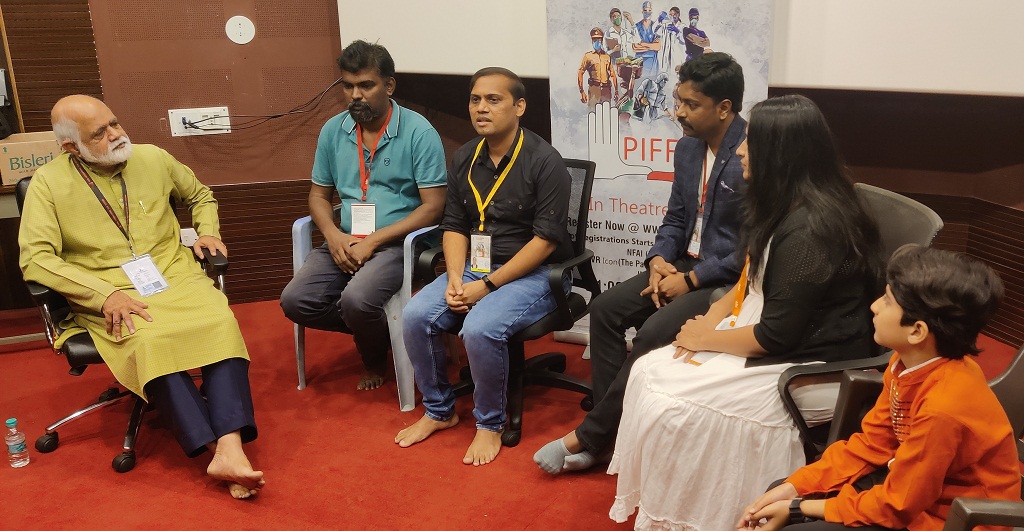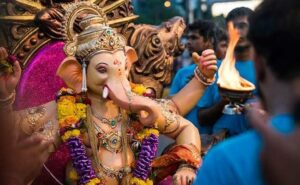PIFF: A Candid Talk Session With Team Members Of God on the Balcony, Poraga Majetay, Firastya, Mayfly And Godakath During Pune International Film Festival

Pune, 7th December 2021: The ‘Candid Talks’ session of 19th Pune International Film Festival (PIFF) Day 6 was conducted by Samar Nakhate, Creative Director of PIFF at NFAI at Law College Road on Tuesday.
Nakhate interacted with the team members of movies from various categories, which included Makarand Mane and Shashank Shende from Poraga Majetay, Vitthal Bhosale, Dr. Swpna Bhosale, Harish Baraskar, Samarth Jadhav, Girish Jambhalikar from Firastya, Kiran Nirmal, Vitthal Jogdand and Swapnil Kolhe from Mayfly, Gajendra Ahire, Krishna Soren and Mrinmayee Godbole from Godakath and Biswajeet Bora from God on the Balcony.

Poraga Majetay
Director: Makarand Mane
Makarand Mane’s first Feature film as a Director was “Ringan” which was critically acclaimed in International market making him win a National and State Award and Filmfare Award. His latest film Poraga Majetay, which effectively presents a very simple story from the real life happening around us has been chosen for PIFF screening.
The story is about Sagar and his father who set out to invite their far-off relatives to Sagar’s wedding. Sagar has to leave his job in Pune in order to live with his parents in the village while working as a farmer and he and his father are always at odds against each other for no particular reason.
The meaning of the relationship between father and son that unfolds at every stage of life, the bonds that are formed anew, the responsibilities that come with it, is a beautiful combination of dialogue and discord in the film.
“The film portrays lots of emotions and sentiments and general disagreement. It focuses on the trajectory that relationships take. There was lots of improvisation and co-ordination to be done among the artists. The idea got into shape during the lockdown period and we started the project. Most of the film was shot on the outskirts of Pune,” said Makarand.

Godakaath
Director: Gajendra Ahire
For Director Gajendra Ahire, the title of the film was initially named ‘Godavari’ but was later changed to ‘Godakaath’ and the film took over 2 and half years to shoot and complete.
“We discussed the idea with the cinematographer, Krishna Soren and the story was formed. We had to put lots of emphasis on the texture of the characters, tones and other aspect issues in the film,” Ahire says.
Gajendra Ahire is an Indian Marathi Filmmaker and a Screenwriter and till now he has made more than 57 Films. He has won multiple State and National Awards and is a known name in theatres for which he has been recognized by Govt. of India, Govt. of Maharashtra and various Institutions across India and abroad.
The trajectory of a river is always tricky. Through its course the river is like a lesson in resilience-it always cuts a new path when it meets with an obstacle, before joining the ocean. GodaKaath takes us through a similar journey of life through its protagonist, Preeti. Preeti in her early thirties is in a top managerial position in an MNC. She is driven by hunger for power, with little regard for personal relationships. A combination of an accidental pregnancy, a fall in career and substance abuse lead her to suddenly quit everything, including life.
She later meets Sadanand, a local veterinary doctor in the village, who teaches Preeti to appreciate small things in life, instead of chasing materialism.
Mrinmayee Godbole, who plays the role of Preeti says, “We enjoyed the process and gave a realistic touch believing that we are not in front of the camera but this was a real life incident. My character had to be very patient and I constantly had to look for solace.”

Mayfly
Director: Kiran Nirmal
A young and passionate film maker, Director, Kiran Nirmal is educated from DES Film and Television Institute and his vision is to present cinema in different and commercial style.
The story of Mayfly revolves around Yoga, a young boy, who, being poor, also lives in fear of his father. He wants to change the condition of his home, so one day he decides to leave the house without telling anyone.
“A Mayfly lives only for 24 hours and it takes 2 years to come to life. Similarly, our protagonist after leaving home and arriving in a big city realizes that whatever his parents told him was meaningful. After arriving in the city his perspective towards life changes and reality dawns on him,” says Kiran.
According to Kiran, a visual medium can create a greater impact as compared to books or theater.
“Through this movie, we wanted to create an impression and wanted people to know how reality is different from our expectations,” he says.
Firastya
Director: Vitthal Machindra Bhosale
Vitthal Machindra Bhosale, Writer and Director of ‘Firastya’, is an officer of the Indian Revenue Service (IRS) and now working as Joint Commissioner of Income Tax at Pune. His debut film ‘Firastya’ is inspired by true events about his own life.
‘Firastya’ is an inspirational story of a struggling boy inspired by true events, depicted in three stages of life that is childhood, teen-age and adulthood.
The village boy, Pandurang has big dreams and with strong will power, hard work and sacrifice he wants to convert his dreams into reality.
His father Bapu, an illiterate poor farm labourer, however wants to educate his son to avoid the stigma associated with illiteracy. Pandurang takes the challenge of achieving his life’s goal and at the age of 13 travels from Satara to Pune to Delhi and Mumbai and returns to his village after becoming Class – 1 Officer.
“I wanted to write a book on the subject but my boss advised me to make a film on the subject, which would highlight the success and failures the person goes through to achieve his goals. It took us 6 months to analyze the script and everything in the film was depicted in a straightforward way,” says Bhosale.
Even though the film is simple and focuses on everyday life in a village, the makers say that entertainment was not lost as the dialogues and the characters were chosen systematically as per the roles.
“Even the music was in harmony with the village environment,” says Bhosale.

God on the Balcony
Director: Biswajeet Bora
Biswajeet Bora is an Indian filmmaker, producer, editor and writer and one of the renowned filmmakers from Northeast India, now based in Mumbai. He worked with internationally acclaimed filmmaker Jahnu Barua for 7 years as an Assistant Director before making his first Hindi film titled “Aisa Yeh Jahaan” which was India’s first carbon neutral film. He has won the Best Director ‘Golden Royal Bengal Tiger Trophy’ for the film “God On The Balcony” at 26th Kolkata International Film Festival. The film has been also officially selected at various international festivals.
The film is set in a remote village of Assam and revolves around Khagen, a farmer, his wife Numali, and daughter, Kuwali. Numali dies in an incident where she is crushed to death by wild Elephants. The story narrates his relentless struggles to carry the dead body of his wife on his bicycle back home from the hospital due to the unavailability of an ambulance. As he walks through the pebbled roads with the body and his daughter, he comes across two reporters and as a result, their journey turns into a different battle altogether.
“I wanted to keep political elements in the movie to make it more captivating to the audience. While writing Khagen’s character I wanted to show his toughness and patience during the crisis. I arranged for motley characters to create an interest and make people think over such incidents,” says Biswajeet.
Advt






